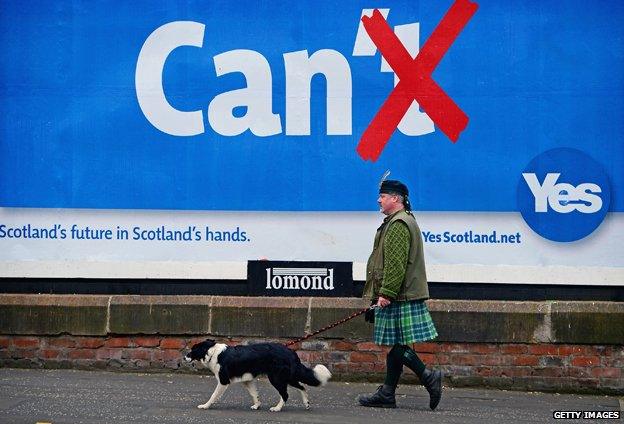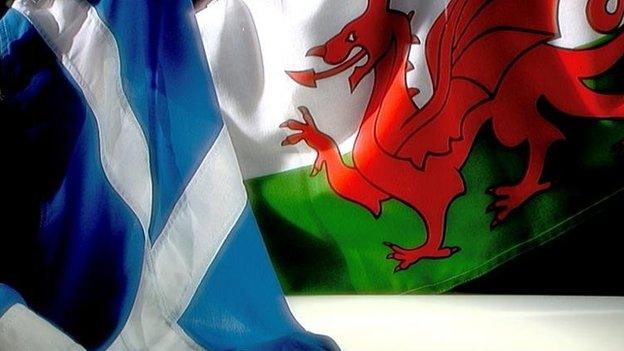'Welsh benefits' from Scottish Yes vote, says Wood
- Published

A similar debate about Wales' future would be good for its people, Plaid Cymru says
Whatever side of the Scottish referendum debate you're on, no one can deny that it has been the most exciting exercise in grassroots engagement we've ever witnessed in these islands.
Scotland is having a national conversation about whether or not its future should lie in the hands of the people of Scotland, and that conversation has inspired so many to get involved.
Many are predicting a turnout at the election of as much as eighty per cent - an unheard of number in an electoral age where anything close to 50% is seen as a success.
The campaign itself has reflected what independence means: it means the people being permanently in charge of their affairs and the people being governed by those they vote for.
A basic democratic principle.
People are watching from all over the world but especially within these islands. That is, of course, understandable because the outcome of Scotland's referendum will impact upon us all.
Whilst it is up to the people of Scotland to decide their destiny, I am in no doubt that the emergence of a new independent state on the island of Britain would be in the interests of Wales.
Fairer society
Scotland, with powers over its own resources and economic policies would from the outset be among the most prosperous in the world. The economic and trade opportunities for Wales would be significant, as an even stronger Scottish economy emerges as a market for Welsh goods and services.
The Republic of Ireland is currently among Wales' most important trading partners and with the enhanced tools of independence, Scotland would be too.
But socially as well, the significance of a new state, on our doorstep, adopting an alternative approach to the race-to-the-bottom social policies of austerity would provide a beacon of social justice that would aid progressives in the rest of the UK in building a fairer society in our nations.
It is a myth to suggest that relations between the countries of Britain are static and have always been static.
The current model of devolution in the UK was introduced in 1999. Before then, cabinet members for the nations were introduced at UK level and even further back of course, one member of the United Kingdom opted for independence.
Relations develop and change over time.

Both sides of the argument agree the vote - whatever the result - will affect all areas of the UK
What will always remain constant is a shared desire to work together on matters upon which we can all agree, but to respect each other's right to go our own way where we do not agree.
That is what happens to a limited degree with health and education under the current devolution settlement.
All eyes may currently be on Scotland, but it is time for Wales to emerge as a participant nation in a changing Britain, rather than remaining a spectator nation on the fringes.
That means the people of Wales having a national conversation where we too can decide where power over our affairs should lie and the basis for partnership we want to build with our neighbours.